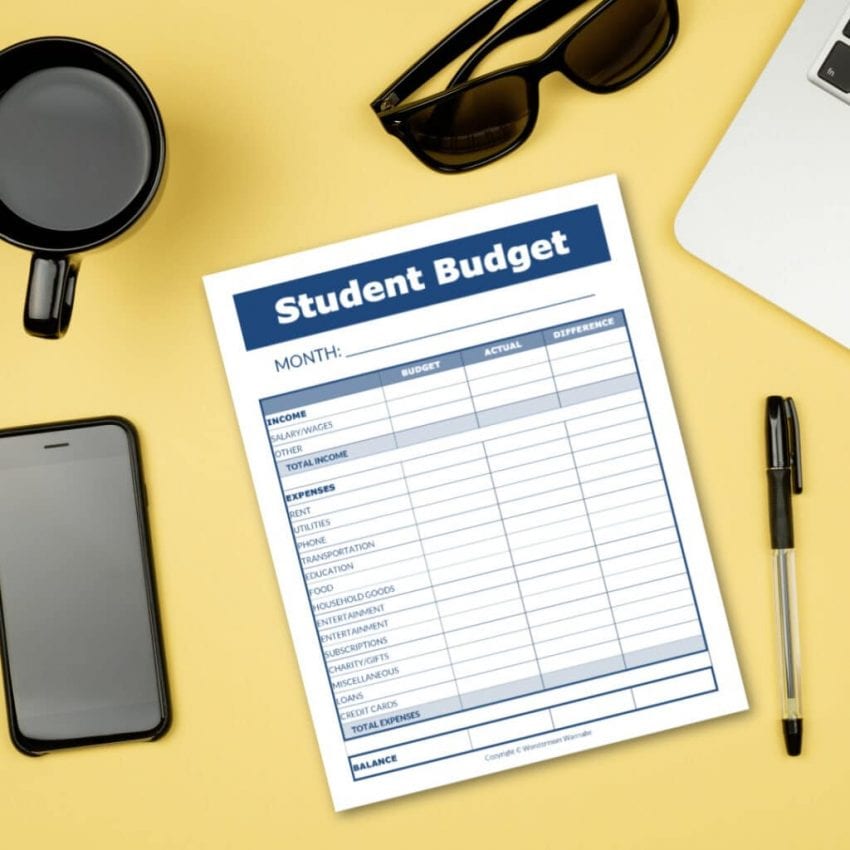Going to college is exciting, but to have success, you will need to learn some new tips and tricks. Fortunately, there are college students who have learned several valuable ways to make the process of learning and living easier. Here is an assortment of ways to make it through college without having poor grades or incurring additional debt.
Way 1: Have a Written Budget for College

If you are going away to college, then it is often the first time that you must plan for all of your own purchases. You may have saved money from a job, or perhaps, you have grants, loans or scholarships to help you pay for your expenses. Despite having access to a lot of money at the beginning of the school year, you won’t want to waste it on silly items. Here are some of the necessities that you must have for school and your residential hall room.
• Backpack for carrying books and supplies
• A computer for completing your homework
• Furniture for your residence hall room
• Clothing for your classes
• Textbooks for studying
• Bicycle for getting to classes
• Vehicle for traveling long distances
• Small Appliances for cooking or storing food
• Bedding for sleeping
Each college student has different requirements for classes, so it is important to understand what you need before buying anything. In some cases, you will have a roommate in your residence hall room, so you can share larger or expensive items such as a miniature refrigerator or a microwave oven. Some colleges provide basic furniture for your room, but you may want to buy additional items. However, it is often possible to buy used things so that you can save money.
Way 2: Have a Daily Schedule
After registering for your college classes, make sure to have a daily schedule. Your class schedule will likely change each semester, so you will need to make adjustments to your time-management plan. Within your schedule, you must plan enough time for sleeping, studying, eating meals and having fun. Experts believe that you should plan to study and complete homework at least 10 hours a week, but you may need to do this more to have the best grades. Avoid going to parties all of the time or hanging out with your friends when you need to study instead.
Way 3: Eat a Healthy Diet

Your college may provide meals in a cafeteria, and there are often multiple locations to eat breakfast, lunch and dinner. Plan your schedule so that you have time to eat three meals a day. You should avoid eating junk foods between meals to that you don’t gain weight. Stock your miniature refrigerator with these foods or beverages to have healthy snacks:
• Fruit – fresh, frozen or canned
• Vegetables – chopped and served with a dip
• Popcorn – low-fat varieties
• Soup – canned soups are great snacks
• Cheese – slices or cubes
• Juice – fruit or vegetable juice
Way 4: Have an Alarm Clock

It is important to wake up in time for your early morning classes. If this is difficult for you, then schedule your classes in the afternoon instead. You should have an alarm clock to help you wake up in time, but you can also use your smartphone’s alarm system. Your smartphone is a great item to use to alert you about your class times so that you aren’t distracted by other things.
Way 5: Learn More about Managing Paperwork and Opening a Bank Account

In addition to having a financial budget, you should learn how to manage your paperwork. You must keep track of your tax information from jobs so that you can continue to apply for financial aid each year at your college. Have a filing system to keep documents and papers safe, but you can also keep track of your financial information with a computer software program. Don’t keep money in your residence hall room where thieves can steal it. Open checking and savings bank accounts on your college’s campus to keep your money safe.
Way 6: Attend Classes and Take Notes
Make sure to attend all of your college classes and take notes during the professor’s lectures. You should have your textbooks with you so that you can understand more about what the professor is talking about during the class. Sit toward the front of the classroom while avoiding using your smartphone so that you can remain attentive while a professor is lecturing.
Way 7: Get Involved In Extra Activities
It is a good idea to get involved in extra activities on your college’s campus, but you should choose wisely. Think about the things that you enjoy the most, including:
• Community politics
• Volunteering for charitable organizations
• Amateur plays
• Singing groups
• Art exhibitions
Avoid getting involved in too many extra activities that make it impossible to have enough time for attending classes or studying.
Way 8: Ordering Your Textbooks

If you want to save money, then rent textbooks from a company that makes ordering online easy. Determine what books are required for each of your classes each semester so that you can rent textbooks using the information that is provided by your professors. When you buy new books that cost hundreds of dollars, you will only receive a small percentage of the price when you sell it to a student or a bookstore. If you rent textbooks each semester instead, then you can save money to use for other things at college. You can rent using a special service Booksrun.









